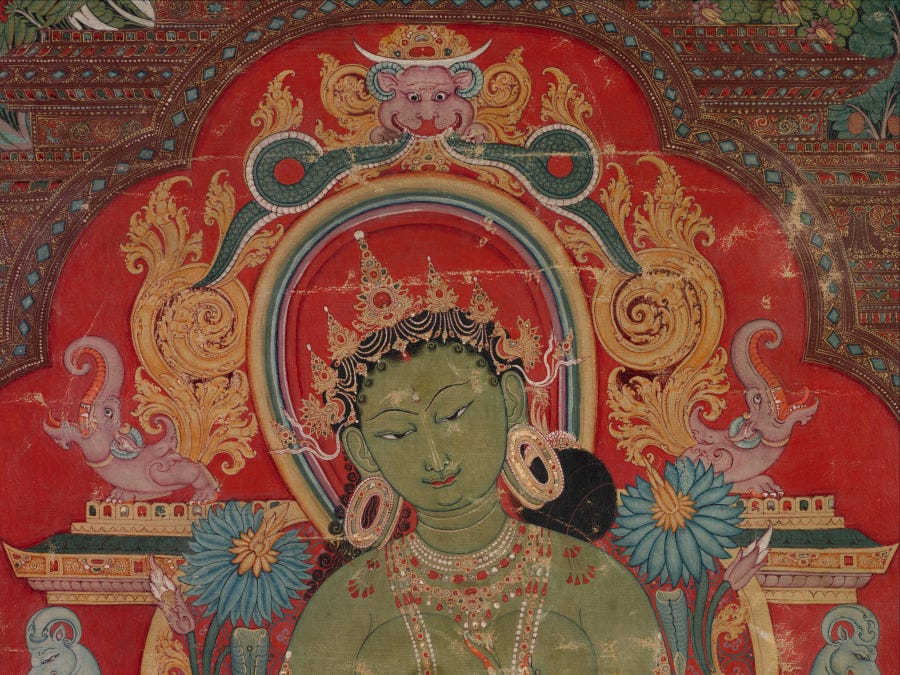1.
Last week, I read a book by Brazilian painter Tiffani Gyatso, whose family, when she was around fourteen, decided to buy an old car and drive from Germany across Russia making their way toward Mongolia. They were gone for almost a year. Or maybe more. There was no mention of school or tests or extracurricular activities for college applications—just a family off to see the world. In Brazil, they had lived on a commune, sharing resources and child-care. And two other adolescents from the commune went along for the ride. Arriving in Mongolia, Tiffani had a religious experience that led her to move to India a few years later when she turned eighteen to study Thangka painting in Dharamashala, home of the Dalai Lama in exile. She then became the first non-Tibetan female allowed to study in a school of traditional Tibetan painting.
As I was reading her story, I kept thinking this must have happened in the 1960s, when it was a thing for people to drop out and go on the hippy trail from Europe overland to India. Or even the 70s, it was something that young people did…. But no, this happened in the 1990s! I was astonished, but also really excited to imagine young people out there prioritizing different values than those held dear in our contemporary lives. Maybe not everyone is with the program?
I am thinking of the Neo-liberal? Post-capitalist? Financialied view that sees everything as a resource to be maximized—even our own lives. We are turning ourselves into products and brands. And this hoop-jumping to buy stuff starts really young — with so much of childhood now being devoted to some future university application —did they take AP classes? What about extra-curriculars? The problem in a country with as radical income inequality and disparity as in the the United States, this all takes on an arms race mentality to position kids to grab spots in programs that might lead to stable work and health care.
It can feel like a life or death thing.
People do lead alternative lifestyles in Japan after all, where healthcare is national and public school is federally managed so that the quality of education is not directly tied to wealth.
2.
Rat Race:
treadmill, competition, nine-to-five, corporate job,, cutthroat world, daily grind, dog-eat-dog world, endless struggle, hamster wheel, squirrel cage, fast track…
Kiasu culture… I’d never heard of that before.
3.
Right now, I am working on a story about two people, who first met by chance aboard a houseboat on Dal Lake, in Kashmir, in 1989. So it takes place around the time Tiffani’s family started driving toward Mongolia. Both people in my story are on summer break from university—she in California and he in Toronto. She has been dreaming of Kashmir her entire life, and so has he. After a few weeks on the houseboat, they embark on a trip together into the mountains, where they fall in love (or so she thinks) and find themselves forever after changed by murals they see in a temple in Ladakh.
Both are overwhelmed by the paintings, which almost seem to have challenged them: So, what are you going to do with this precious life you’ve been granted?
Not unlike the Tibetan Thangka painter Tiffani Gyatso, a conventional life holds no interest. The pull to “get with the program,” get married, work to pay down a mortgage. But unlike Gyatso, the two people in my story do exactly that. Meeting in a cafe 30 years later, they are middle aged. He has just lost his wife, and she feels old and frumpy. They have coffee and talk.
As I was writing the story, I kept wondering: would this story ever resonate with the young people reading the submission slush piles for the literary magazines associated with big universities… For that is where I would be submitting this story, if I ever finish it. It seems almost irrelevant nowadays… or is it?
3.
On the Big Island in Hawaii, there is a town in Puna which is considered to be one of the last remaining places where people can disappear and live off the radar. They have a barter system and the federales apparently steer clear. The place is full of artists, alternative healers, Hawaiian sovereignty activists, growers, organic farmers and off-the-grid survivalists—not to mention people dodging the law. The last time I was there, a lady I met by the pool at a hotel in Kona mentioned her brother was living there. She lowered her voice when she said it. He was avoiding the police, apparently. Cocaine, she said. I was amazed that is still possible.





I read submissions for 2 literary magazines and that story would appeal to me. Then again, I am not young.
I wish you could, too. But I'm guessing that Taos will be wonderful. Keep me posted. I'll post, too.